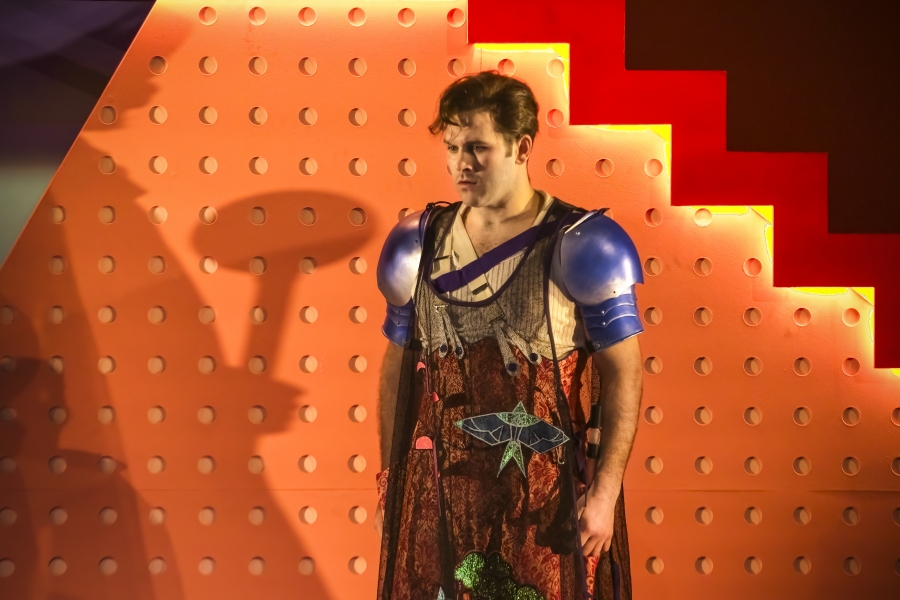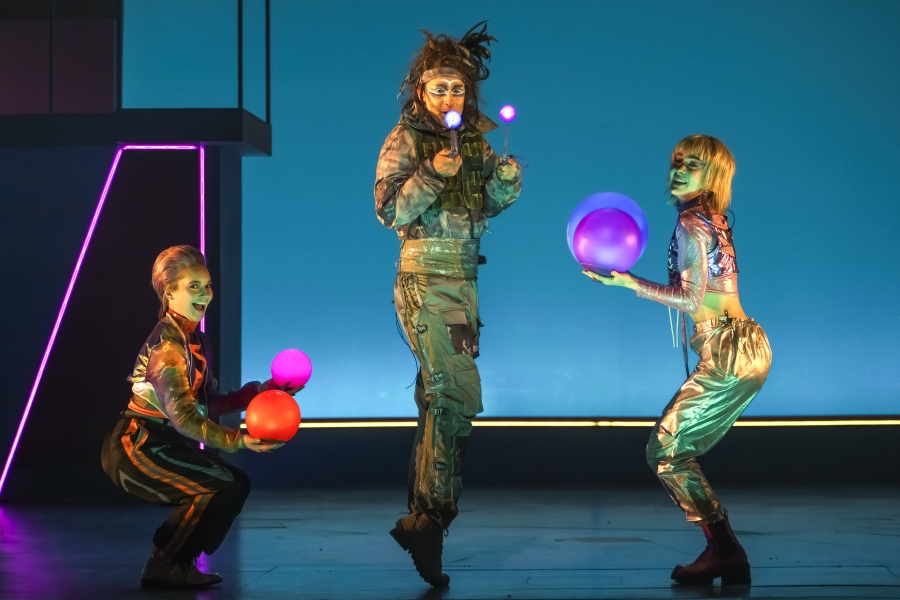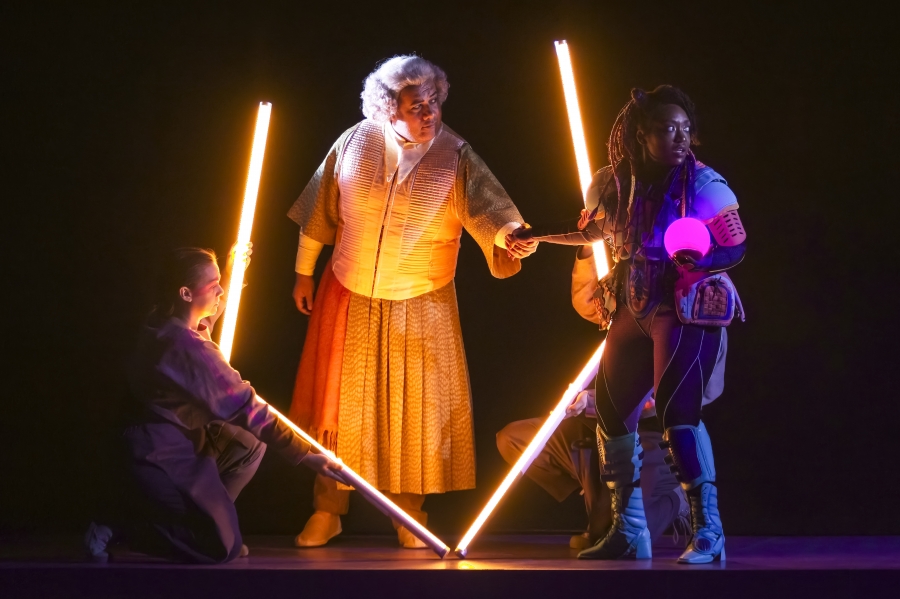IT would be hard to think of a production so ripe for ripping to shreds than this take on Mozart’s Magic Flute, often described as a pantomime opera. Someone should have told director Daisy Evans much earlier in the creative process that, while in keeping with the panto theme, she was giving Welsh National Opera one very large and expensive turkey.
However, if approached as either a children’s production (just a laugh with a daft libretto and olts of silly characters) or an academic exercise in applying some current theories of gender and discourse analysis, the work is vaguely interesting. On the other hand, it may have been the director’s intention to create a production for adults who thought they were coming to see Mozart’s glorious opera. Maybe, but what adults would want to see this? Maybe the sort of people who subscribe to the Meghan and Harry My Truth world. The fact that Pamina has a strong American accent and Tamino is a feckless dupe prince fitted perfectly.
Trystan Llŷr Griffiths
Llinos Haf Jones, Quirijn De Lang and Sophie Williams
Jonathan Lemalu and Raven McMillon
It takes amazing confidence, courage or perhaps just arrogance, to apply the sledge hammer of social theory (such as Hall and Foucault) combined with the linguistic tools of analysis to reconstruct an opera’s text. The danger of this method in unsubtle hands is like that proverbial sledgehammer and nut. In trying to break an established libretto with such force the inner kernel is destroyed. It can be reassembled but who is brave enough to claim to be able to better Mozart and his friend and librettist Emanuel Schikaneder. Yes, modern audiences can recoil at the story’s treatment of women, slavery and even Freemasonry, but this is also a 1791 statement of the Enlightenment, of reason and logic and science over superstition and religion. Tamino and Pamina are the children of the Enlightenment. It would take more social change to become enlightened about slaves and women but the fundamentals of, shall we say good and bad are immutable.
So, what do we have? We are presented with a world where some no doubt well-meaning nonsense equals fact. I heard audience members asking each other if this was a spoof, whether the director was sending up younger people, but I honestly do not think she was. I really think she believed this was a serious piece of music theatre. The clincher for me was when Tamino declares the light of the sun and of the moon are equal and the assembled oddballs declare this a statement of utter genius. The fact that it is complete nonsense does not matter. Yes, polar opposites can be seen as constructs (thus the answer to the dilemma of Sunlight and Moonlight, Sarastro and the Queen of the Night, is our young people become Dawn and Dusk). But hang on, Tamino declares the light of the sun and of the moon are equal and the assembled oddballs declare this a statement of utter genius. Presumably this is His Truth.
But back to the audience watching and listening to Mozart’s opera. How on earth anyone who had read the synopsis of the opera reconciled this with the bizarre rewritten libretto and rewritten plot, including a farcical prologue, as Oprah would say “Waaaat?
Okay so let’s run through it incredibly quickly as it does not merit wasting your time reading through it all. Sarastro and the Queen of the Night are a separated couple having failed to cope with their contrasting interests, er, night and day. Their daughter Pamina had been at school with Tamino, and they both seem to have known Papageno. Pamina is kidnapped (sort of) by her dad and is now living with him in his palace while mum wants her back in her palace.
Pamina is of the generation that rejects facts and education and any form of conformity so is bored senseless (again I think literally) by the actually rather interesting lecture room talk on the anatomy of birds. She whinges all the time about missing her mum. Yes, birds figure in this show a lot, and I mean a deeply annoying and distracting lot. Where is a shotgun when you need one?, I heard someone whisper, as yet again a bird on a stick was waved in the air. The lecturer is Monostatos who I think was supposed to be a gay freak as he certainly seemed to be hanging out with a lot of Max Wall lookalikes who seem to have just escaped from a mental institution. In the end Pamina, not Tamino, leads the pair through the ordeals and they become the Dawn and Dusk while mummy and daddy are seemingly reconciled, well sort of. I did warn you.
Maybe some teenagers (or Californians) would like this rewriting particularly as we also have characters that are male and female reduced to persons (the three boys were sung by women who have not only transgendered but invested in clothes and wigs that were reminiscent of Rod Stewart hairstyle circa 1970). In fact, the costumes are just plain awful throughout. Again, a long list of dull references to films and TV shows could fill out more words here but again it does not merit the time. The photos say enough.
If annoying birds are one theme of this production, another is balls. Yes, multicoloured ball, balls of all sizes, but ultimately all just balls. Designer Loren Elstein could have raided her childhood toy box and thrown it all up in the air and hoped for the best.
The stage work was also heavy and cumbersome with too many people moving the rather basic set furniture around, waving those birds on sticks, and while I am sure they are excellent at their craft, the operators of illuminated birds that seemed to pop up here, there and everywhere with I am sure some great logic, frequently seemed to in the way.
Several very well-respected actors took part in Playschool in the early stages of their careers. The quite young cast of this kids show must similarly hope that they too will not suffer from being associated with his Playschool meets Mozart through the fluorescently lit window.
The best thing was the Tamino of the excellent tenor Trystan Llŷr Griffiths and I have no idea whether he had to shave off his usual beard for this gender fluid farrago but at least it will grow again. Tamino does not fight a monster as the opera opens and he is in bed unless it a trouser snake under the bedclothes. While Julia Sitkovetsky sang a tingling Queen of the Night, the characterisation was so poor she came over more a bitter jilted housewife who wanted more alimony than a regal figure. Jonathan Lemalu sang a rather undestated Sarastro.
I assume Raven McMillon’s spoken accent is genuine American and because of a certain Princess of Canada conjures up all sorts of negative moaning vibes but she sings the role perfectly well. (As being from Baltimore I suppose she has a Maryland accent). It takes some doing to turn one of opera’s most lovable characters Papageno into an annoying creep and that makes our heart go out to Quirijn De Lang as he has to plough through vast lines of awful spoken text and then try to engage us with his pleasant singing, but the damage has been done.
Vocally Alun Rhys-Jenkins almost manages to rise above the just horrible characterisation of Monostatos and with the benefit of my eyes firmly closed he really does deliver. Chuma Sijeqa has a lovely speaking voice and while again dramatically left in the lurch by the direction, has excellent stage presence. Sending up gay men clearly doesn’t seem to be much of an issue in this production as the Armed Men, nicely sung by Thomas Kinch and George Newton Fitzgerald, are not only reduced to being gossipy idiots but under the influence of the magic bells dance off hand in hand. Yes, there is nothing like campness to make audiences laugh.
It is not Llinos Haf Jones, Sophie Williams and Carys Davies fault that they have to try to sing the three boys as some sort of genderless oddities (the Young Ones but not in the Cliff Richard sense) and as with the trio of what I guess stayed as ladies Claire Barnett-Jones, Nazan Fikret and Kezia Bienek sang beautifully.
The orchestra kept the faith and even coped with playing the overture while the puerile made-up pre-story was acted out above them. Conductor Paul Daniel must have wondered what on earth was happening in front of his eyes, but fortunately maintained his attention to give a top form reading of the score.
At Wales Millennium Centre until March 17 and touring,
Main image Julia Sitkovetsky
Images: Craig Fuller



I couldn’t agree more. Only lasted until the interval
an accurate review
I wish I had read the reviews before wasting £60 on watching this mess. Portmeirion No 6 costume copies! If we knew were Herr Mozart was buried we could have watched him spinning in his grave. Seeing one of his masterpieces messed about like this was truly embarrassing and sung in English too! The queen did hit the right notes but it lacked excitement and threat.
Puppeteers had starring roles annoyingly.
Daisy Evans should leave this career and leave it to the original experts.
That’s what we are for!